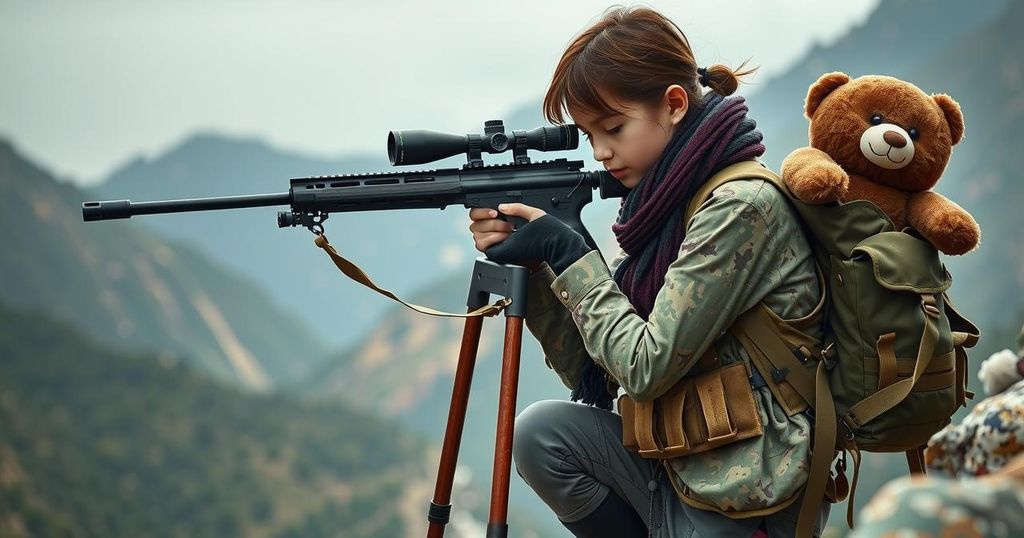Conflicts
AN, ANINA, ASIA, CHIN, CHIN STATE, CIVIL WAR, CNDF, EUROPE, FALAM, INDIA, JUNTA, MANCHESTER, MANCHESTER CITY, MYANMAR, REFUGEES, SOCIETY, TIKTOK, UN, UNITED KINGDOM, VIOLENCE
Nia Simpson
The Resilient Teenage Sniper Defying Gender Norms in Myanmar’s Civil War
Anina, a teenage sniper in Myanmar’s civil war, defies traditional gender roles and military oppression. As the only female fighter in her unit, she showcases resilience despite the loss and violence surrounding her. With a unique background and support from international allies, she challenges societal expectations while advocating for empowerment among young women. Her experience illustrates the broader implications of armed conflict on youth and gender dynamics in Myanmar.
Anina embodies numerous traits of an ordinary teenager, displaying a fondness for football and dancing, particularly TikTok trends. However, her life has drastically shifted due to ongoing civil war in Myanmar, which has consumed her adolescence since the military coup. At seventeen, she sustained an injury while fleeing a military airstrike, highlighting the harsh realities faced by young fighters like her in this conflict.
As a trained sniper for the Chin militia, Anina challenges both Myanmar’s military authority and traditional gender roles. Her significant combat experience has gained her respect in a society where women are frequently viewed as too weak for combat roles. Notably, she expressed, “I stopped counting after three,” referring to her number of confirmed kills, marking the heavy emotional toll of warfare.
In Falam, Anina stands out as the sole female resistance fighter among many, marking a historic effort to capture the military’s last stronghold without assistance from established ethnic armies. The Chin National Defense Force (CNDF) aims to reclaim areas of Myanmar, but they confront an enemy equipped with advanced military resources and a track record of violent reprisals.
The recruitment of children into armed conflict in Myanmar remains deeply ingrained, with reports indicating that both the military and ethnic militias enlist minors. Following the February 2021 coup, it was estimated that the military has killed and tortured numerous children, further exacerbating the need for young individuals to join anti-junta groups for survival and resistance.
Anina articulates the pain of loss, stating, “Because of them, I have lost many friends,” as she risks her life in the mountains, countering the junta forces with precision only developed through years of training. Her skill set was honed from a young age during hunting trips with her father, solidifying her resilience and commitment to the cause.
Despite the challenges faced by women in combat roles, Anina’s determination positions her as a formidable force on the battlefield. Yet she critiques the disparities, noting societal expectations that often see girls relegated to domestic roles. Her journey as a sniper began under the mentorship of a foreign fighter, illustrating the solidarity formed across international lines in the fight against oppression.
While the CNDF formally restricts combat duties to those over eighteen, it acknowledges young fighters’ realities and aspirations. Anina’s defensive operations have propelled her into frontline action, despite sentiments shared by leaders like Olivia Thawng Luai, who emphasize the importance of education for youth, stating, “They should be pursuing their dreams.”
Having been wounded in battle, Anina persists, challenging stereotypes that suggest women belong in traditional roles. Activists argue that the ongoing conflict compels a reevaluation of gender norms, as women like Anina actively engage in combat for their country’s future. Nevertheless, the military’s reported intention to draft women into their ranks raises questions about the lasting impacts of such changes on society.
Anina maintains a close bond with her fellow sniper and boyfriend, Vak Vei, reinforcing their commitment to each other amidst the chaos. However, she is distanced from family ties, acknowledging the emotional toll this separation brings. She expresses a desire to return home but remains steadfast in her resolve, asserting, “I will stay until we win,” emphasizing her commitment to the resistance.
Finally, Anina delivers an empowering message to young women: resist societal and domestic violence and fight back against oppression. While the realities of war have reshaped her identity, she reflects poignantly on her lost past, saying, “These days, I don’t feel like dancing so much,” encapsulating the transformative impact of conflict on youth like her.
Anina’s story is a testament to resilience and courage amidst the devastating backdrop of Myanmar’s civil war. Her journey encapsulates the challenges faced by young women in combat and the deep-seated societal expectations that both constrain and empower them. As the struggle for democracy continues, the evolving gender dynamics in the conflict potentially pave the way for transformative changes in Myanmar’s societal roles. The unwavering spirit embodied by Anina serves as an inspiration and a clarion call for resistance against oppression, emphasizing that even in conflict, hope and bravery can flourish.
Original Source: www.theguardian.com








Post Comment